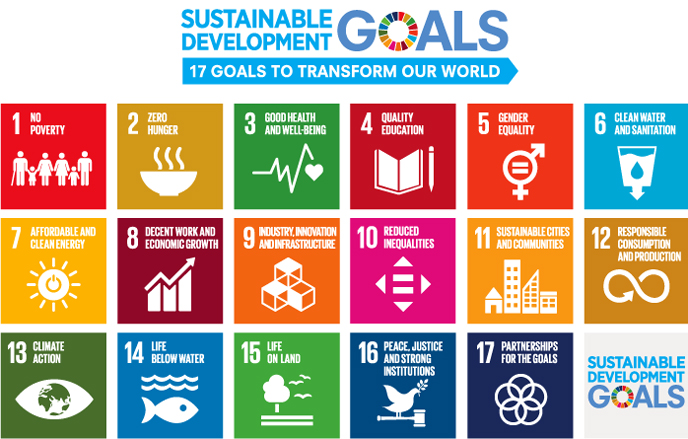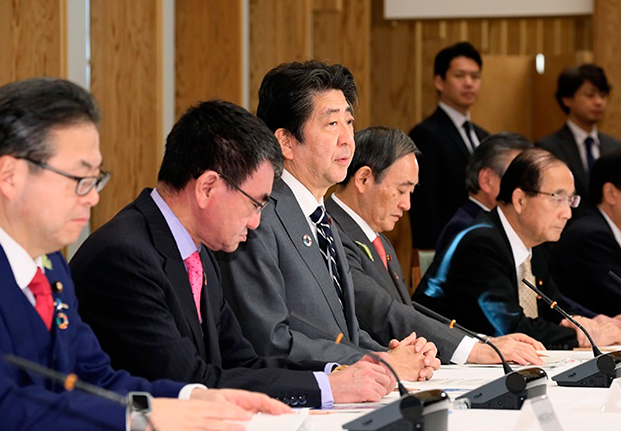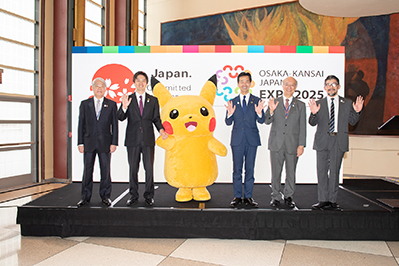ODA Topics 3
Efforts by the Government of Japan Aimed at Achieving the Sustainable Development Goals (SDGs)
1.Adoption of the SDGs
The Sustainable Development Goals (SDGs) are a set of international goals adopted unanimously at the United Nations Summit in 2015. The SDGs set out 17 goals and 169 targets toward the realization of a sustainable, diverse and inclusive society where “no one will be left behind.”

17 goals of the SDGs
The SDGs were formulated as the successor to the Millennium Development Goals (MDGs). The MDGs were established via discussion among UN experts in 2001, and set out eight goals as development targets primarily for developing countries, with the deadline of 2015. While the MDGs brought some positive results with significant achievements mainly in such areas as extreme poverty, HIV, and malaria, some targets remained unachieved in such areas as reducing infant and maternal mortality rates. Moreover, while the world was striving to attain the MDGs, mutually-entangled global issues newly emerged, namely the increased severity of environmental issues and climate change, and the widening disparities both domestically and internationally. Furthermore, there were significant changes in the situation surrounding the international community, such as the expanding role of private companies and NGOs as development actors.
Responding to these changes over time, the SDGs are characterized by its participatory feature, wherein all kinds of actors play important roles, which include not only governments and certain specialists, but also private-sector corporations, local governments, NGOs/NPOs, academia and beyond, while having a universality in which not only the developing countries, but the international community as a whole including developed countries take action. These are the points which differ greatly from the MDGs.
2.Efforts by the Government of Japan aimed at achieving the SDGs
After the adoption of the SDGs, Japan began by improving its domestic foundations. Specifically, the “SDGs Promotion Headquarters” was set up, headed by the Prime Minister, and with all Cabinet Ministers as members, in order to put in place a system for the SDGs to be tackled by the Government acting as one. At the same time, the “SDGs Promotion Roundtable Meeting” was established, comprised of a wide range of relevant parties (government, private sector, NGO/NPO, experts, international organizations, and other various bodies), so as to collaborate thoroughly with diverse stakeholders, that are important to achieve the SDGs.
At the Sixth Meeting of the SDGs Promotion Headquarters held in December 2018, the “SDGs Action Plan 2019” was decided with three main pillars, namely: (1) promotion of “Society 5.0” that is tied with the SDGs with commitments of the public and private sectors, (2) regional revitalization driven by the SDGs, and (3) empowerment of the next generation and women as the future leaders to achieve the SDGs. The Action Plan states clearly the key challenges of the SDGs, in which Japan will exhibit leadership in the international community as the Chair of the G20 in 2019, in order to contribute to “nation-building” around the world, and the “human resources development” to achieve the former, based on the concept of human security. The ultimate aim of the Action Plan is to realize a prosperous and vigorous society, where “no one will be left behind.”

Prime Minister Shinzo Abe speaking at the Sixth Meeting of the SDGs Promotion Headquarters (Photo: Cabinet Public Relations Office of the Government of Japan)
3.Collaboration with diverse stakeholders
As the SDGs cover a wide range of targets, it is necessary for various kinds of stakeholders, not only the Government, but also private-sector corporations, local governments, NGO/NPO, and other actors, to work in cooperation toward the achievement of the SDGs, in order to realize the concept of “no one will be left behind.”
At the reception hosted by the Government of Japan at the United Nations High-Level Political Forum on Sustainable Development (HLPF) held in New York in July 2018, Japan impressed attendees with the attractiveness of the forthcoming Expo 2025 Osaka, Kansai, Japan, by means of speeches, videos, and booths, under the partnership between a wide range of agencies and organizations making efforts to promote the SDG in Japan, such as the relevant ministries and agencies, private-sector corporations, and citizen groups. Japan also announced its initiatives aimed at achieving the SDGs.

Reception hosted by Japan at the HLPF
Moreover, the Government of Japan presents the “Japan SDGs Award” to commend companies and organizations for their excellent initiatives that contributes to the achievement of the SDGs, from the perspective of making SDGs-related initiatives across Japan visible, and promoting actions. At the Second Japan SDGs Award Ceremony held in December 2018, the Japan Food Ecology Center Co., Ltd. which is taking measures to counter food losses by utilizing food waste received the Chair of the SDGs Promotion Headquarters (Prime Minister) Award. In addition, awards were given to a cooperative developing and providing products in accordance with “Ethical Consumption*1,” a local government rolling out its unique recycling system internationally, an incorporated association promoting the employment of disabled people via a chocolate brand working together with the disabled and Hikikomori*2 people, a company providing cheap and high-quality toilets to developing countries, an NGO striving to empower HIV-positive single mothers, and a company working to build value chains in automobile recycling industry and create local employment, among others. This has confirmed that a broad range of actors are leading efforts to achieve the SDGs. Such original ideas and initiatives by domestic actors are a driving force toward the achievement of the SDGs in Japan.
The Government of Japan is supporting the efforts of the organizations that are committed to the SDGs, including the award recipients, by presenting them an official logo, disseminating their information on the “Ministry of Foreign Affairs × SDGs” Twitter, and listing their initiatives on the “Japan SDGs Action Platform” on the Ministry of Foreign Affairs website.
4.The Japanese “SDGs Model” to the world
Japan is determined not only to promote the SDGs domestically, but to proactively share and expand its efforts outside of the country. For example, at the Japan-Mekong Summit Meeting held in October 2018, the “Mekong-Japan Cooperation Projects for Promoting Sustainable Development Goals (SDGs)” was adopted to strengthen cooperation for promotion of the SDGs between the Japan and Mekong regions. Japan will continue to further accelerate this flow of efforts into the international community, with a focus on the regions of Southeast Asia and Africa.
2019 could be considered as an important year for the achievement of the SDGs, since Japan hosts the G20 and TICAD7, and the UN’s first SDG Summit is held in September. Japan will strive toward the achievement of the SDGs by working in collaboration with various stakeholders and collecting wisdom to the maximum, so as to present the image of “Japan as a strong actor in the SDGs” to the international community and demonstrate its leadership.
*1 Selection and consumption of products and services, in consideration of people, society and the environment.
*2 State of people who secluded themselves in their houses and rooms for many years without going to work or school, and not participating in any social activities.
